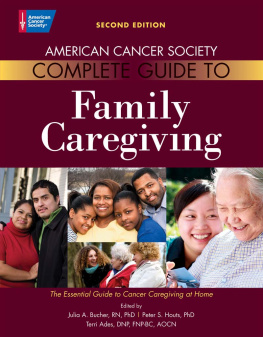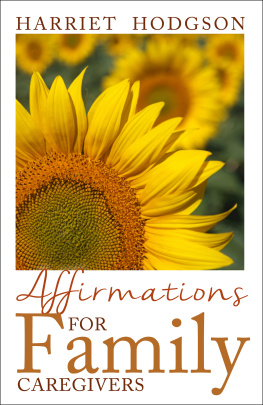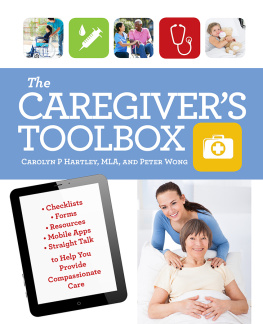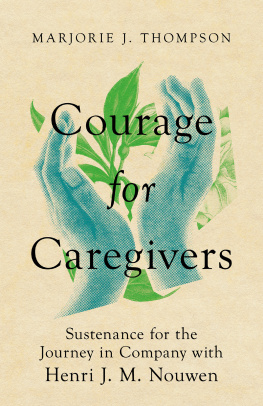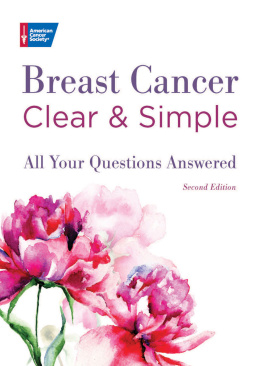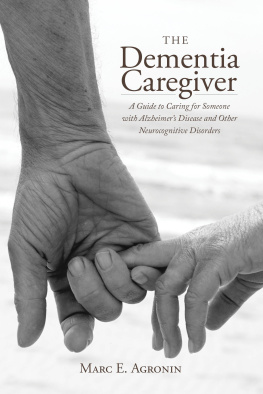
Published by the American Cancer Society/Health Promotions
250 Williams Street NW, Atlanta, Georgia 30303-1002 USA
Copyright 2000, 2003, 2011 American Cancer Society
First edition 2000. Second edition 2011.
A version of this book was published in 1997 by the American College of Physicians as Home Care Guide for Cancer: For Family and Friends Giving Care at Home.
All rights reserved. Without limiting the rights under copyright reserved above, no part of this publication may be reproduced, stored in or introduced into a retrieval system, or transmitted in any form or by any means (electronic, mechanical, photocopying, recording, or otherwise) without the prior written permission of the publisher.
For permission to reprint any materials from this publication, contact the publisher at .
Printed in the United States of America
Design and composition: LaShae V. Ortiz, New York, NY
Copy editing and indexing: Beth Allen, Houston, TX
5 4 3 2 1 11 12 13 14 15
Library of Congress Cataloging-in-Publication Data
American Cancer Society complete guide to family caregiving : the essential guide to cancer caregiving at home. 2nd ed. / edited by Julia A. Bucher, Peter S. Houts, and Terri Ades.
p. cm.
Rev. ed. of: Caregiving. Rev. ed. 2003.
Includes bibliographical references and index.
ISBN-13: 978-0-944235-00-3 (pbk. : alk. paper)
ISBN-10: 0-944235-00-X (pbk. : alk. paper)
1. CancerPalliative treatment. 2. CancerPatientsHome care. 3. Caregivers. I. Bucher, Julia A. II. Houts, Peter S. III. Ades, Terri B. IV. American Cancer Society. V. Caregiving. VI. Title: Complete guide to family caregiving.
RC271.P33C37 2011
649.8dc22 2010015968
AMERICAN CANCER SOCIETY
Managing Director, Content: Chuck Westbrook
Director, Book Publishing: Len Boswell
Managing Editor, Books: Rebecca Teaff, MA
Editor, Books: Jill Russell
Book Publishing Coordinator: Vanika Jordan, MSPub
Editorial Assistant, Books: Amy Rovere
For more information about cancer, contact your American Cancer Society at 800-227-2345 or cancer.org.
Quantity discounts on bulk purchases of this book are available. Book excerpts can also be created to fit specific needs. For information, please contact your American Cancer Society, Health Promotions Publishing, 250 Williams Street NW, Atlanta, Georgia 30303-1002, or send an e-mail to .
A NOTE TO THE READER
The information in this book is not official policy of the American Cancer Society and is not intended as medical advice to replace the expertise and judgment of your cancer care team. It is intended to help you and your family make informed decisions, together with your doctor.
For more information about cancer, contact your American Cancer Society at
800-227-2345 or cancer.org.
CONTENTS
ACKNOWLEDGMENTS
Many people contributed to the development of this book. They include physicians, nurses, psychologists, and social workers, as well as people with cancer and their family and friends. Several individuals have been especially generous in contributing their time and expertise across the years and, as a result, have had a substantial influence on the development and growth of this book. For this revised second edition, we would like to thank the following contributors: Margaret Crowley, MSN, CRNP, APRN-BC; Cara Granda-Cameron, MSN, CRNP; Brigitte Haagen, DNSc; and Patricia Siegrist. In addition, we acknowledge the administrative support provided by the Department of Nursing, York College of Pennsylvania.
For previous editions of this book, we are deeply indebted to Regena Tripp, RN, OCN; David Houts; Charles Schreiber; Bruce Nicholson, MD; George Simms, MD; and the Cancer Prevention and Control unit of the Pennsylvania Department of Health. We also express our appreciation to the following people for their support and suggestions during this project: John Stryker, MD; Frank Davidoff, MD, FACP; Thomas Feagin, MD, FACP; Charles Lewis, MD, FACP; Nick Leasure, MD; David Hufford, PhD; Steven Hulse, MEd; Judy Lyter, RN; Catherine Kleese, RN, OCN; Mary Jo Templin, RN; Janice Mills, RN, MS; Bonnie Bixler, MEd; and Julia Yost.
Much of the information in this book was based on content from the first edition, which was created with the assistance of the contributors and reviewers below.
Reviewers, First Edition
Diane Blum, ACSW
Marjorie Cassel
Mary Ann Cegielsky, RN, MSN, OCN
Deborah Clark, RN, BSN
Margaret Davitt, RN, MSN
Diane Erdos, RN, MSN
Shirley Faddis, MSN, OCN
Timothy Freer
Sandra Frey, RN, OCN
Phyllis Hall, MSW
Edward Henry
Bonnie Koch, RN, OCN
Kenneth Kohler
Mary Lander, RN
Carolyn Messner, ACSW
Linda Mogul, MSW
Bruce Nicholson, MD
Sharon Olson, RN, MSN
Carol Ann Peters, RN, MSN
Harold Piety
Eric Pfeiffer, MS
James B. Ray, PharmD
Kathleen Rine, RN, MSN
Barbara Robinawitz, PhD
Susan A. Rokita, RN, MSN
Irena Rusenas, MS
Lori Sandohl, RN, DSN, CW, OCN
Marion Sattazahn
William Sattazahn, Jr.
Marion Spangler
Nancy Toth, RN
Barbara Van Horn
Katherine Yoder, RN, OCN
Renee Atchison Ziegler
Contributors, First Edition
Carole A. Bean
Georgia Brown, RN
Elise M. Givant, RN, OCN
Harold A. Harvey, MD
Joan F. Hermann, LSW
Kathy B. Kambic, RN, OCN
Mary Lander, RN
Allan Lipton, MD
Matthew J. Loscalzo, MSW
Arthur M. Nezu, PhD
Christine M. Nezu, PhD
Bruce Nicholson, MD
Carol Nolt, MSW
Eric Pfeiffer, MS
Dale B. Schelzel, RN, OCN
Mary A. Simmonds, MD
Sandra J. Spoljaric, RN, OCN
Glenda M. Trumpower, MSW
James R. Zabora, MSW, ScD
Administrative Support, First Edition
Departments of Behavioral Science and Medicine, Penn State University College of Medicine
Department of Clinical and Health Psychology, School of Health Professionals, Allegheny University of the Health Sciences
Department of Nursing, Bloomsburg University of Pennsylvania
Johns Hopkins Oncology Center
INTRODUCTION
When a person receives a cancer diagnosis, life changes. But life also changes for the caregiver who helps that person get through the cancer experience. The caregiver whether it be a spouse, partner, adult child, or friendalso participates in the experience, filling a role that is crucial to the physical and emotional well-being of the person with cancer.
Changes in health care have led to an increase in the involvement of family and friends in the day-to-day home care of the person with cancer. Today, cancer treatment is often administered on an outpatient basis instead of in the hospital. Even when treatments are done in the hospital, the patient typically spends less time there than in the past. With such changes, the role of primary caregiver becomes multifacetedranging from home health care aid to companion.
The caregiver may take on responsibilities that, just a short time ago, were reserved for trained health care professionals. Caregivers and patients themselves have the responsibility of monitoring medications, managing side effects, and reporting conditions or situations that require professional intervention. The caregiver may help feed, dress, and bathe the person with cancer, as well as arrange schedules, manage insurance issues, and provide transportation. Caregivers serve as legal assistants, financial managers, and housekeepers. They often have to take over the duties the person with cancer once performed, while continuing to meet other family members needs. In addition, a caregiver can have an enormous influence on how the person with cancer deals with his or her illness. The caregivers encouragement can help the person with cancer stick with a demanding treatment plan and take other steps that are necessary to get well, such as eating nutritious meals and getting enough rest.
Next page
